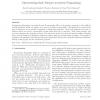49 search results - page 1 / 10 » Characterizing a Tunably Difficult Problem in Genetic Progra... |
GECCO
2000
Springer
13 years 8 months ago
2000
Springer
This paper examines the behavioral phenomena that occur with the tuning of the binomial-3 problem. Our analysis identifies a distinct set of phenomena that may be generalizable to...
GECCO
2003
Springer
13 years 10 months ago
2003
Springer
Abstract. This paper provides an empirical test of a hypothesis, which describes the effects of structural mechanisms in genetic programming. In doing so, the paper offers a test p...
FLAIRS
2006
13 years 6 months ago
2006
In this paper we test whether a correlation exists between the optimal mutation rate and problem difficulty. We find that the range of optimal mutation rates is inversely proporti...
GECCO
2009
Springer
13 years 11 months ago
2009
Springer
Solving complex, real-world problems with genetic programming (GP) can require extensive computing resources. However, the highly parallel nature of GP facilitates using a large n...
FGCS
2010
13 years 3 months ago
2010
Evolutionary Algorithms, including Genetic Programming (GP), are frequently employed to solve difficult real-life problems, which can require up to days or months of computation. ...

